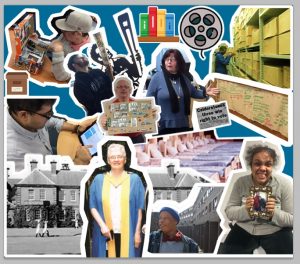An online archive where people can share their stories about learning disability history has gone live, write Liz Tilley and Vicky Green.
The history of all kinds of people with learning disabilities in different circumstances is being brought to life in an online archive. This resource pulls together accounts concerning institutions, community services and advocacy – and more stories are sought
The Inclusive Archive of Learning Disability History (www.inclusivearchive.org) can be used by everyone, including people with profound and multiple disabilities.
The archive project ran over 2014-17. It built upon years of research supported by the Open University’s Social History of Learning Disability Group. It covers a wide array of work on the history of institutions, community services and advocacy bodies, much of which was generously financed by the Heritage Lottery Fund.
Twenty years after the group was founded, we decided it was time to pull together all the research, stories, memories and artefacts that people had collected.
We wanted to produce an online archive that would be fully accessible and enable people to make good decisions about what they shared, how and with whom. This meant building a team of researchers with and without learning disabilities who were employed as equals.
We also worked with local archives to explore how collections could be opened up to people with learning disabilities and what needed to happen to support more of them to participate in local heritage.
The aim was always to create an archive that was truly inclusive. So it needed to involve all people with learning disabilities – including those with profound and multiple learning disabilities, whose lives are so often hidden from public view.
To do this, we had to tackle confusion and anxiety regarding the Mental Capacity Act 2005 (England and Wales) and provide legal clarity around best interests decisions when it comes to sharing stories and depositing in archives. This was achieved.
In addition, the legal advice we secured has opened up opportunities to enable more people with learning disabilities to be involved in archives, which is a fantastic outcome.
Based on our research findings, we built a prototype, which is now live.
We would like to encourage as many people as possible to explore the archive and add their projects to it (see box). We are now developing the prototype into a sustainable archive to ensure all this wonderful material is preserved.
Find out about the project on its accessible website: http://inclusivearchiveproject.org
Vicky Green is a researcher and self-advocate; Liz Tilley is a lecturer at the Open University
Disability heritage backed by the lottery
Interested in how learning disabled people influenced everyday life in the past and today? Curious about how they change policy, influence activism and improve human rights for all of us?
At Heritage Lottery Fund, we are too, writes Liz Ellis. We use National Lottery players’ money to fund a wide range of activities that benefit heritage, people and communities across the UK.
HLF cares about inclusion. Since 1994, we have awarded more than £40 million to over 900 projects that specifically benefit disabled people, many of which enable them to explore the history and heritage of disability.
Our Inclusive Heritage conference in 2015, and popular Community Discussion Forum (see box) increase opportunities for people with disabilities to share knowledge about the projects they lead and boost expertise.
As a funder, we are always keen to promote great partnership and co-production models.
In particular, we are very proud to work with the Inclusive Archive Project, funded by the Arts and Humanities Research Council. We feel sure future HLF applicants will find inspiration in it.
Liz Ellis is policy adviser, community and diversity, at Heritage Lottery Fund

